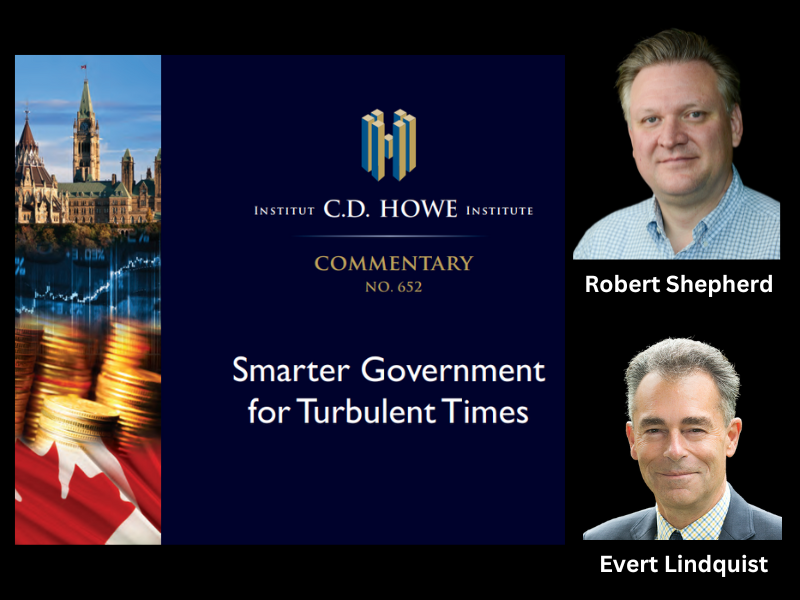
SPPA Professor Robert Shepherd co-authors report with Evert Lindquist “Smarter Government for Turbulent Times”, calling for strategic spending reviews by Federal Government. Published by the C.D. Howe Institute, February 2024. ISBN 978-1-77881-016-9; ISSN 0824-8001 (print); ISSN 1703-0765 (online)
C.D. Howe Press Release (February 6, 2024): Six Reasons Why Canada Needs Strategic Spending Reviews
Ottawa should implement regular strategic or spending reviews, drawing on past Canadian and international experience, according to a new report from the C.D. Howe Institute.
In “Smarter Government for Turbulent Times,” authors Evert A. Lindquist, University of Victoria, and Robert P. Shepherd, Carleton University, conclude that a comprehensive and systematic review is well overdue. Although Ottawa has a modest spending review underway, in the wake of the COVID-19 pandemic, a burgeoning deficit and new expenditures, and the rapidly changing economic and security climate, the launching of a comprehensive and systematic review is needed, they argue. Ottawa should also institutionalize annual reviews and expand the capabilities of the Public Service to carry them out.
“Spending and strategic reviews can be more regular, open and forward-looking,” said the authors. “Our purpose here is to identify a potential strategy for the Government of Canada to develop.”
When developing spending reviews, politicians and commentators typically have different motivations in mind, but the authors outline six reasons for undertaking strategic and/or spending reviews in government: prudent fiscal policy, prudent public management, generative learning, driving innovation, anticipatory policies and meeting public expectations. Although these arguments differ in focus, the authors maintain they reinforce each other and justify the need for modern, democratic governments to institute regular spending and strategic reviews.
What’s more, the authors point to the earlier Canadian experience as well as more recent experience in countries such as The Netherlands, Denmark, Ireland and Spain to help provide other, feasible possibilities in developing a more robust approach to reviews in Canada.
“These international experiences are instructive for three reasons,” the authors explain. “First, they underscore what is distinctive about the Canadian approach to spending reviews; second, international experiences point to important design considerations which remind us that reviews can be more open and more forward-looking; and third, reviews are most effective in achieving lasting success when they are regular, systematic and part of an embedded system.
The authors also identify elements that can help in the design of a spending and strategic review, such as the importance of political leadership, having a clear focus for the review and engaging internal and external experts as well as members of the public.
For Lindquist and Shepherd, Canadian governments will need to undertake more significant spending reviews than the modest one currently in progress, and it’s time that Canadian governments of all political stripes institutionalize systematic spending and/or strategic reviews as needed.
“Spending and strategic reviews are critical elements of sound fiscal policy and public management,” the authors emphasize. “Instituting annual spending or strategic reviews more regularly and publicly will lead to better public understanding of the current and future policy challenges confronting governments.”